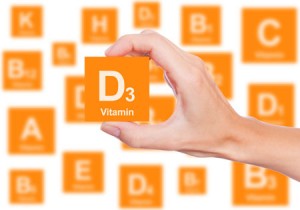Vitamin D Supplementation May Not Be Effective in Bipolar Depression, But Is Still Worth Doing
 In some studies, vitamin D supplementation (1,500 IU/day) has been found to improve unipolar depression. Recently, researchers led by Wendy K. Marsh found that compared to placebo, 12 weeks of vitamin D3 supplementation (5,000 IU/day) did not produce greater improvement in depressive symptoms. The study, presented at the 2016 meeting of the Society of Biological Psychiatry, included 33 adult participants whose vitamin D levels remained deficient throughout the study.
In some studies, vitamin D supplementation (1,500 IU/day) has been found to improve unipolar depression. Recently, researchers led by Wendy K. Marsh found that compared to placebo, 12 weeks of vitamin D3 supplementation (5,000 IU/day) did not produce greater improvement in depressive symptoms. The study, presented at the 2016 meeting of the Society of Biological Psychiatry, included 33 adult participants whose vitamin D levels remained deficient throughout the study.
Editor’s Note: Caution is urged in interpreting this small study, especially because the participants did not achieve healthy levels of vitamin D.
Low levels of vitamin D are common in children and adults with bipolar disorder. Future research may explore whether raising vitamin D levels to healthy levels has a beneficial effect on mood. There are many other benefits to vitamin D supplementation. It can improve cognition, regulate calcium and phosphorus absorption, and maintain healthy bones and teeth. It may also protect against diseases such as cancer, type 1 diabetes, multiple sclerosis, rheumatoid arthritis, and Crohn’s disease. Improved cardiovascular health is also a possible benefit of vitamin D supplementation.
Omega-3 Fatty Acids May Be Helpful Early in Schizophrenia, But Not Later
 Some studies have suggested that omega-3 fatty acids may be helpful in the treatment of schizophrenia, but data to support this idea have been inconsistent. A recent meta-analysis of research on omega-3s and schizophrenia suggests that this nutritional supplement might be more useful in early-stage schizophrenia than in later illness.
Some studies have suggested that omega-3 fatty acids may be helpful in the treatment of schizophrenia, but data to support this idea have been inconsistent. A recent meta-analysis of research on omega-3s and schizophrenia suggests that this nutritional supplement might be more useful in early-stage schizophrenia than in later illness.
At the 2016 meeting of the Society of Biological Psychiatry, researchers led by Alexander T. Chen presented the findings of their meta-analysis. First they analyzed six studies that shared a common scale for measuring schizophrenia symptoms. In these studies, omega-3 fatty acids did not outperform placebo when used as an add-on treatment to antipsychotics for people with schizophrenia.
In four remaining studies of omega-3 fatty acids and schizophrenia, the omega-3s were associated with improvement only in patients in the early stages of schizophrenia. Compared to placebo, the supplements decreased non-psychotic symptoms, decreased the dosage of antipsychotic medication patients required, and improved early treatment response (but not late treatment response) in patients in their first episode of schizophrenia.
In the same study, omega-3 fatty acids also reduced conversion to full-blown schizophrenia and psychotic symptom severity in patients at high risk for schizophrenia who were having preliminary symptoms of the illness.
Editor’s Note: Researcher Paul E. Keck has also found that omega-3 fatty acids may be more effective early in bipolar disorder rather than later. He reported that younger patients with bipolar depression and rapid cycling showed more improvement when taking the omega-3 fatty acid EPA than when taking placebo. In contrast, patients with bipolar depression who were over the age of 45 did worse on EPA than on placebo.
Part of the ambiguity about whether omega-3 fatty acids can help treat or prevent mental illness may be explained by the supplements working better in younger people or earlier in the course of an illness.
Folate Fortification in Commercial Foods Led to Greater Cortical Thickness
 In 1996, the US began to require that enriched cereal grain products be fortified with folate, a vitamin that is particularly important to fetal brain development. A new study of children born before and after this policy change suggests that the increased folate in commercial foods after 1996 led to increases in cortical thickness in the children born after the change.
In 1996, the US began to require that enriched cereal grain products be fortified with folate, a vitamin that is particularly important to fetal brain development. A new study of children born before and after this policy change suggests that the increased folate in commercial foods after 1996 led to increases in cortical thickness in the children born after the change.
At the 2016 meeting of the Society of Biological Psychiatry, Joshua L. Roffman and colleagues described their research into the effects of folate fortification. The researchers identified 3,309 children born between 1993 and 2001 who had had a magnetic resonance imaging (MRI) brain scan. Analysis of the scans showed that children born after folate fortification began had thicker cortices than those born before the change. The frontal and temporal regions of the brain were particularly affected.
A thin cortex is a risk factor for schizophrenia and other cognitive problems.
Editor’s Note: Folate supplementation has also been shown to enhance the effects of selective serotonin reuptake inhibitor (SSRI) antidepressants in adults with lingering symptoms of depression.
Up to a third of the population may have a deficit of MTHFR, an enzyme important for folate metabolism, and for these people, l-methylfolate is recommended rather than folate itself.
Medical Device May Treat Alzheimer’s Disease
A recently completed clinical trial suggests that NeuroAD, a treatment system that combines transcranial magnetic stimulation and cognitive training targeted at brain regions affected by Alzheimer’s disease, may be effective at treating mild to moderate cases of the illness.
Neuronix Ltd, the company that produces the device used to deliver transcranial magnetic stimulation in the trial, plans to seek Food and Drug Administration approval for NeuroAD. It would be the first device approved for the treatment of Alzheimer’s in the US. The device is already in use in Europe and Asia.
In the clinical trial, 131 patients received six weeks of the NeuroAD treatment or a sham treatment used as a comparison. Those participants who received the real intervention performed better on an assessment of Alzheimer’s and experienced minimal side effects.
In transcranial magnetic stimulation, a non-invasive procedure, magnets placed near the skull stimulate electrical impulses in the brain. This activates neurons, releasing excitatory transmitters and brain-derived neurotrophic factor (BDNF), which is important for new synapse formation and long-term learning and memory.
Editor’s Note: This editor (Robert Post) has long advocated the use of repeated transcranial magnetic stimulation (rTMS) with simultaneous cognitive behavioral or other positive therapy to activate and enhance specific neural circuits and relieve depression. The trial of NeuroAD adds evidence of the positive effects of this approach in domains other than depression. Cognitive training enhanced by rTMS may be helpful with a variety of cognitive difficulties.
Microdoses of Lithium May Stabilize Cognition in People with Alzheimer’s
Several researchers have found that lithium has some value in fighting dementia. The researcher Lars Kessing has published several studies showing that people taking clinical doses of lithium for bipolar disorder have a lower incidence of dementia in old age.
In 2011, another researcher, Oreste Vicentes Forlenza, reported that a year of low-dose lithium (typically around 300mg/day) slowed deterioration in people with mild cognitive impairment compared to placebo.
In an article published in the journal Current Alzheimer Research in 2013, researchers led by Marielza Andrade Nunes reported that very small doses of lithium (more than a thousand times lower than doses used to treat mood disorders) also improved mild cognitive impairment in people with Alzheimer’s disease.
In Nunes’ study, participants with Alzheimer’s disease were randomly assigned to receive either 300 micrograms of lithium daily or a placebo. Beginning at three months of treatment, those receiving the microdoses of lithium showed stable performance on a common Alzheimer’s evaluation tool that measures how well patients remember, recall information, and follow directions; while those taking placebo got worse.
This continued over the 15 months of the study, with the difference between the two groups intensifying over time—those taking placebo got worse, while those getting the microdoses of lithium remained stable.
There were no complaints of side effects from the microdoses of lithium, and participants showed no sign of impairment to their kidney or thyroid function (a risk with the higher doses of lithium used to treat bipolar disorder).
In 2015, Nunes and colleagues reported in the journal PLOS ONE that in a mouse model of Alzheimer’s disease, mice treated with chronic low doses of lithium in their water had less memory disruption, fewer plaques in the brain, and fewer reductions in cortex and hippocampus size compared to mice given plain water.
These studies suggest that low or micro doses of lithium may be a promising treatment for Alzheimer’s disease. Much more research is needed to determine appropriate lithium dosing for the treatment of dementia or cognition problems.
Treatment with Hormone EPO Improved Cognition in People with Unipolar and Bipolar Disorder
People with unipolar depression and bipolar disorder may experience cognitive difficulties, even when they’re not currently depressed. In a study published in the journal European Neuropsychopharmacology in 2016, researchers led by Caroline Vintergaard Ott determined that treatment with the hormone erythropoietin (EPO) may help. EPO is produced in the kidney and increases the production of hemoglobin and red cells.
Seventy-nine participants with unipolar or bipolar disorder were randomized to receive infusions of either EPO or a saline solution once a week for eight weeks. By the end of the study, those who received EPO showed significant improvements in the speed of their complex cognitive processing compared to those who received saline. EPO is known to induce the production of red blood cells. The improvements in processing speed lasted for at least another six weeks after red blood cell production would have normalized.
Those participants who received EPO not only had improved scores on tests of processing speed, they also reported fewer cognitive complaints. The EPO treatment was most likely to be effective in participants who had more impaired cognition at the beginning of the study.
In previous research by the same research group presented by Kamilla W. Miskowiak at the 2014 meeting of the International Society of Bipolar Disorders, EPO also improved sustained attention and recognition of happy faces.
Inflammation Predicts Depression and Anxiety Four Years Later in Older Americans
A large study of retired Americans found that those with high levels of the inflammatory marker C-reactive protein in the blood had more depression and anxiety. Higher CRP also predicted severity of depression and anxiety four years later.
The study, by researchers Joy E. Lin and Aoife O’Donovan, included 18,603 people over age 50 from the Health and Retirement Study. It was presented at the 2016 meeting of the Society of Biological Psychiatry.
Lin and O’Donovan hope that treating or preventing inflammation may be the key to preventing symptoms of depression and anxiety.
Psychotherapy Improved Depression, Reduced Inflammation
A recent study shows that psychotherapy can not only improve depression symptoms, but may also reduce the inflammation that often accompanies them.
Researcher Jean Pierre Oses and colleagues randomly assigned participants with depression to receive Supportive-Expressive psychodynamic therapy, which is designed to help patients understand conflictual relationship patterns, or an alternative therapy. Among the 47 participants who received Supportive-Expressive therapy, depression improved significantly after 16 sessions, and blood levels of the inflammatory markers interleukin-6 and TNF alpha also dropped.
The research was presented at the 2016 meeting of the Society of Biological Psychiatry.
Kynurenine Pathway Suggests How Inflammation is Linked to Schizophrenia
The kynurenine pathway describes the steps that turn the amino acid tryptophan (the ingredient in turkey that might make you sleepy) into nicotinamide adenine dinucleotide. This pathway might be a connection between the immune system and neurotransmitters involved in schizophrenia.
A recent autopsy study by researcher Thomas Weickert and colleagues explored this link by determining that in the brains of people with schizophrenia and high levels of inflammation, messenger RNA for Kynurenine Aminotransferase II (KATII, a step on the kynurenine pathway) was elevated in the dorsolateral prefrontal cortex compared to the brains of people who died healthy and those with schizophrenia but low levels of inflammation.
The KATII mRNA levels also correlated with mRNA levels of inflammatory markers such as glial fibrillary acidic protein and interleukin-6.
Blood measures related to the kynurenine pathway also differentiated people with schizophrenia from healthy controls. People with schizophrenia had lower levels of tryptophan, kynurenine, and kynurenic acid in their blood. The low levels of kynurenic acid in the blood were correlated with deficits in working memory and smaller volume of the dorsolateral prefrontal cortex.
Weickert and colleagues suggest that blood levels of kynurenic acid might provide a measurable indicator of the degree to which people with schizophrenia are experiencing problems with executive functioning (planning and decision-making) and loss of brain volume.
Meta-Analysis Shows Inflammation is Common in Unipolar Depression, Bipolar Depression, and Schizophrenia
In a symposium at the 2016 meeting of the Society of Biological Psychiatry, Mark Hyman Rapaport described the results of his research group’s meta-analysis of studies comparing levels of inflammation in the blood of people with unipolar depression, bipolar depression, and schizophrenia. Rapaport and colleagues determined that people acutely ill with any of the three illnesses showed abnormally high levels of certain inflammatory proteins. These included: interleukin-1beta, interleukin-6, TNF alpha, and c-reactive protein. Those who were chronically ill showed elevations in interleukin-6.
These data are consistent with increasing evidence that inflammation also occurs in the brain. Brain inflammation can be observed by measuring translocator protein binding, a measure of brain microglial activation, using positron emission tomography (PET) scans.








